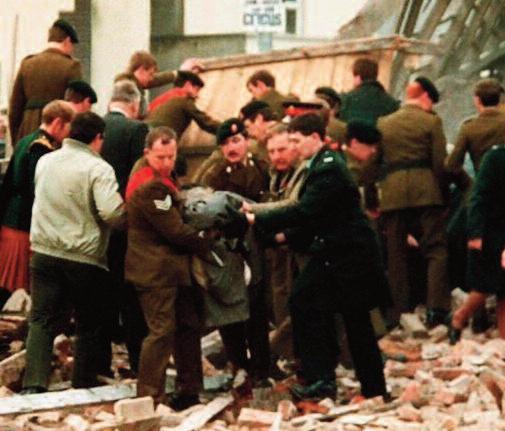
4 minute read
REVIEWED BY HARPER CLEVES
The Enniskillen bombing provoked a backlash from Protestants and Catholics forcing the PIRA to apologise claiming it was a "mistake"
Provisionals leadership when he quotes Seán Mac Stifoian on the question of Protestant opposition postunited Ireland: “There would be no place for those who say they want their British heritage. They ’ ve got to accept their Irish heritage… otherwise there would be no place for them” .
Their fundamental method was sectarian in nature. They ignored the views and aspirations of Protestants. This same dismissiveness reflects itself today in the debates around a border poll. While they speak of reaching out to the Protestant community, the underlying reality of the position of Sinn Féin today is that, like it or lump it, capitalist unity is inevitable. They have no qualms that by a simple majority, one community can be coerced into a state they have no desire to be a part of. This displays a profound amnesia on their part. Catholics did not, and will not, abandon their aspiration for reunification even when they were a minority for decades. Neither will Protestants abandon their opposition to a united Ireland if they become a minority within the Northern state. A majority at the ballot box does not eradicate the clash of aspirations and identities that is present in the North.
It was hard to disguise this sectarian edge when car bombs destroyed the centres of largely Protestant towns. At other times, the Provos campaign was nakedly and viciously sectarian – for example, in the period of 1975-76, more than 60 Protestant civilians died in sectarian attacks.
Even when the actions of IRA volunteers were not intentionally sectarian, the campaign as a whole was objectively sectarian and acted to deepen division rather than break it down. The author references this reality, “To a large extent the Provos were fighting a war of attrition against the Protestant community in arms” .
7
The “Ulsterisation” of the security forces compounded this. Even when members of the state forces, such as UDR soldiers, were targeted, this was viewed as an attack upon the Protestant community and drove them further into the hands of the state.
Likewise, their bombing campaign against commercial targets – such as Bloody Friday, when the PIRA detonated 20 bombs in the space of eight minutes in Belfast city center, killing nine people, including five civilians – drove young Protestants into the hands of loyalist paramilitaries. Former PUP leader David Irvine explained that he joined the UVF in the aftermath of these bombings, and thousands joined the UDA and UFF.
The forerunner of the Socialist Party at the time, in an article written by Peter Hadden, warned what the reality of these methods meant: “The IRA does have a military capacity – not to shift or drive out the British –but to stir up sectarian reaction in Northern Ireland. The fear created by the Canary Wharf bomb (in London) has not been fear of a new and effective “antiimperialist struggle” by the IRA, but fear that any new campaign could push Northern Ireland over the precipice towards all-out sectarian conflict. ”
8
Nationalism & Socialists
Marxists are the utmost defenders of democratic rights. This does not mean, as some on the left crudely present, solely the rights of Catholic workers. We defend the democratic and national rights of all communities on this island. Any attempt to coerce any community into an arrangement which they do not consent to is a recipe for sectarian conflict and ultimately -– unless the working class unites in a struggle for socialism – civil war. The history of partition is testament to that.
Socialists base ourselves on the fundamental unity of the working class in the unions, workplaces and in struggles. We campaign to give this unity political expression, campaigning for the building of a mass anti-sectarian party of the working class. We advocate a socialist Ireland - with full and equal rights for all communities, including the protection of minorities –in a voluntary socialist federation with a socialist Scotland, Wales & England.
Unfortunately, throughout much of the book, the author downplays the role of the working-class and the effect of class struggle upon the republican movement and society more generally. While ultimately concluding that the armed campaign was a failure, and commenting upon the effect that it had in intensifying sectarian divisions in the North, the author does not grapple with the sectarian logic of the campaign in ignoring and dismissing the views and aspirations of the Protestant community. Despite these limitations, One Man’ s Terrorist provides quite a detailed and comprehensive account of the republican movement that is worth reading.n
Notes
1 Dan Finn, One Man’s Terrorist (Verso 2020) pg.1 l 2 Ibid, pg 38 l 3 Peter Hadden, Common History Common Struggle l 4 One Man’s Terrorist, pg 38 l 5 Ibid, pg 73 l 6 Leon Trotsky, The Bankruptcy of Individual Terrorism, 1909 l 7 One Man’s Terrorist, pg 171 l 8 Peter Hadden,










